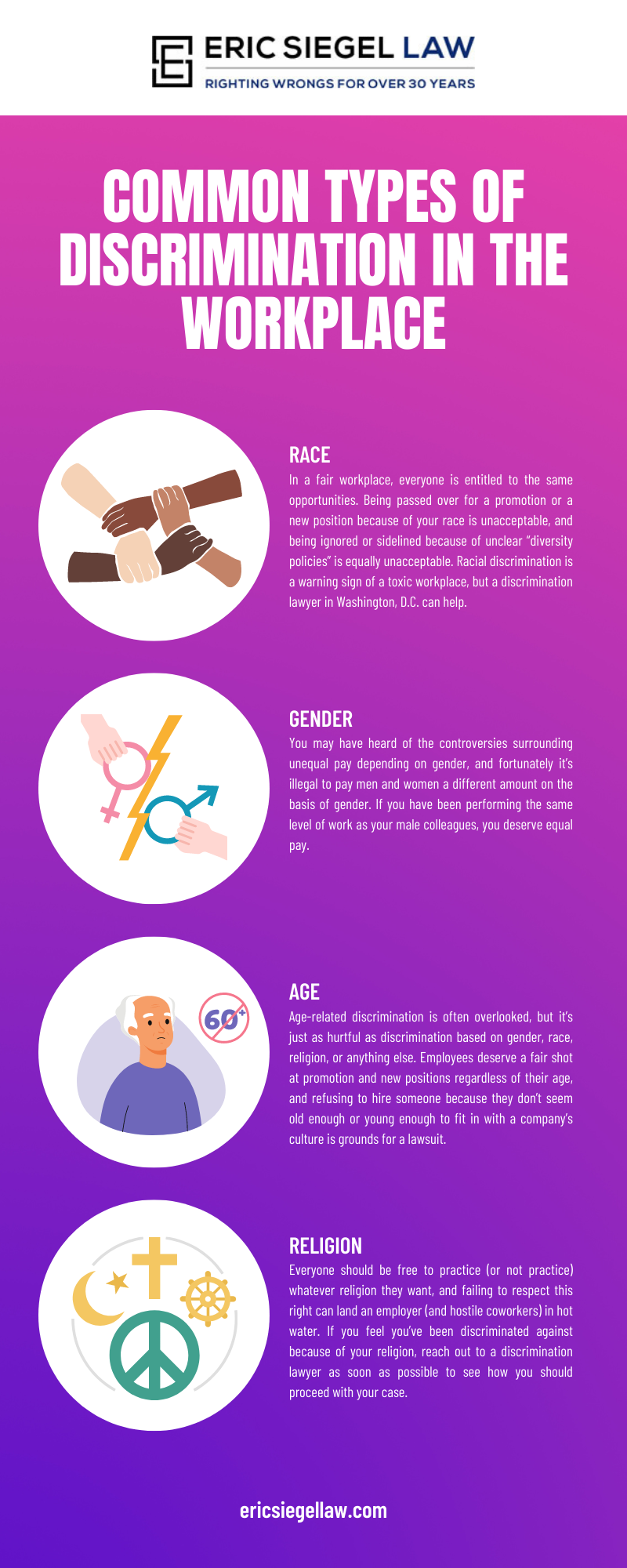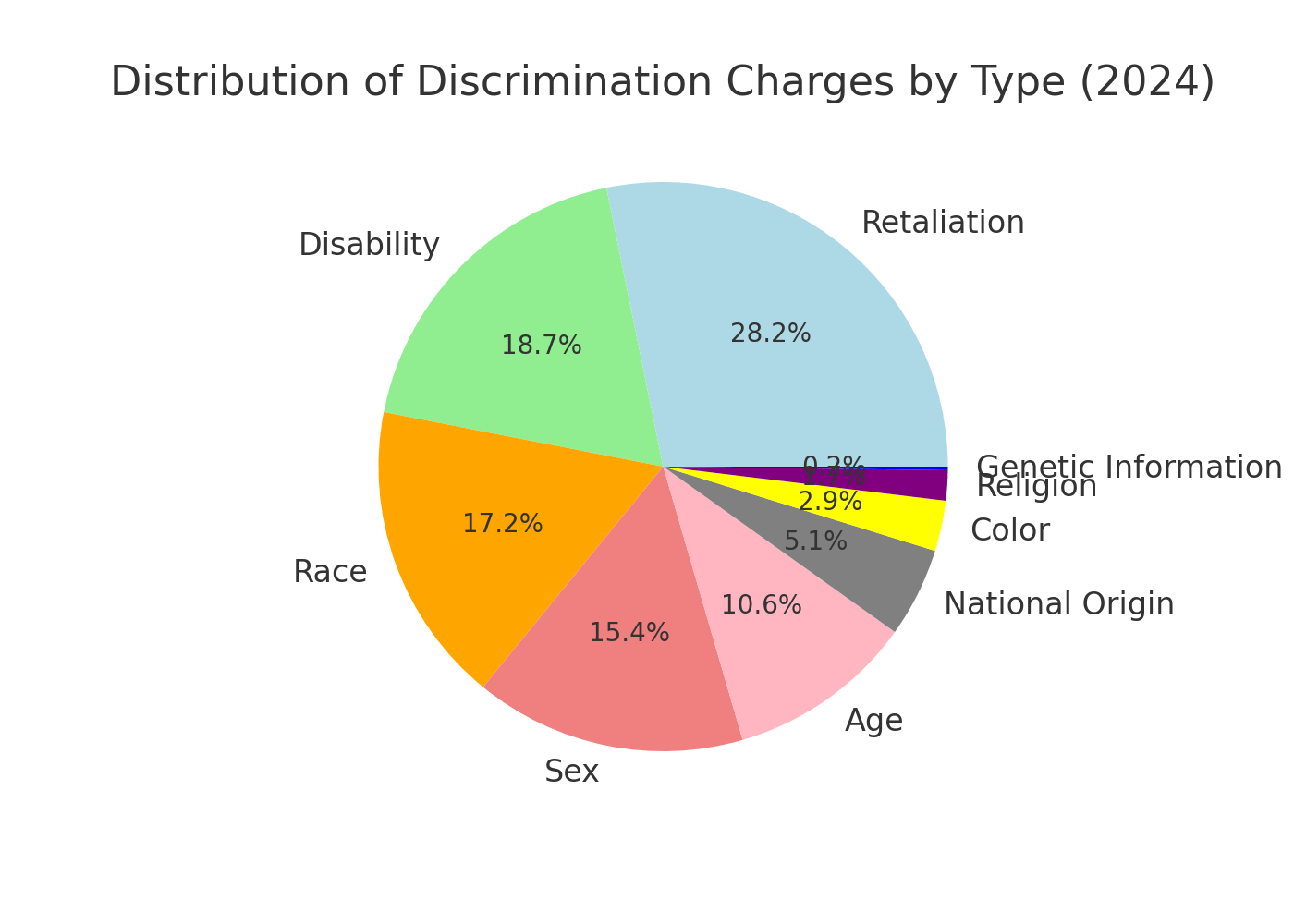Discrimination Lawyer in Washington, DC 
A discrimination lawyer in Washington, D.C. from Eric Siegel Law has been representing victims of discrimination for many years. We understand the complex nature of these cases, and can be strategic in yielding a positive outcome for our clients. Discrimination occurs when a person is treated less favorably compared to another due to their background or personal characteristics. This is defined as direct discrimination. By comparison, indirect discrimination is when there is unreasonable policies or rules that is applicable to everyone but has the most effect on those disadvantaging due to personal characteristics.
What Protected Characteristics may Be Used to Discriminate?
Discrimination can happen in various areas of life, including education, employment, using services, buying a house, or renting property, and more. Employers have a legal duty to take certain steps in preventing discrimination in the workplace. Furthermore, employers may be held liable for discriminatory actions taken against their employees by co-workers, management, clients, or other parties. As your Washington, DC discrimination lawyer from Eric Siegel Law can review with you, here are examples of protected characteristics that may be discriminated against:
- Age
- Disability
- Gender
- Religion
- Relationship status
- Pregnancy
- Race
- Sexual orientation
- Immigration status
What Else Is There to Know About Discrimination?
Another example of discrimination is harassment, which is unwanted conduct having to do with a protected characteristic. In order to be considered harassment, it must have the effect or intention of violating that person’s dignity, humiliating them, creating a hostile environment, or degrading in nature. Examples of harassment include gossip, using nicknames, intrusive questions, inappropriate comments, and/or bullying.
A common excuse many people use to justify discriminatory words or actions is that they did not have the intention to offend the other person. To say a behavior or statement was not made maliciously is not a sufficient excuse. If it impacted the person in a negative way and was related to the protected characteristics listed above, then it may be deemed discrimination.
The Equal Pay Act
Over 50 years ago, President John F. Kennedy signed the Equal Pay Act of 1963 into law. This legislation made it illegal for employers to engage in wage-based discriminatory conduct based on gender. However, more than 50 years after this law was passed, the gender pay gap remains significant. According to the 2020 report published by PayScale.com, women still only make $0.81 for every $1.00 earned by men. Wage-based discrimination remains a real and consequential force in the American workplace, even though it is far less obvious than it once was. This issue is prevalent among certain industries which are male-dominated. Your employer may not proudly proclaim that they pay you less than your male colleagues, but it is certainly possible that you’re experiencing illegal pay inequity challenges regardless.
The Equal Pay Act is not the only law that governs pay-related discrimination. If you have grounds to file legal action against your employer, we may argue that your situation stands in violation of numerous laws. However, understanding the basics of the Equal Pay Act will help to clarify the kinds of foundational claims we’ll likely need to make to argue your case successfully. Under the Equal Pay Act, an employer may be held liable for illegal pay discrimination if it can be proven that a man and woman working for the same employer and substantially engaging in the same job are receiving unequal pay. The man and woman do not need to have the same job title or description for this standard to be upheld in favor of the aggrieved. A lawyer will closely examine your wages compared to other employees within your company and look for evidence to see if discriminatory practices have taken place.
Pay Discrimination Legal Guidance Is Available
If you’re concerned that you’re being unjustly compensated as a result of your gender, please connect with the experienced legal team at Eric Siegel Law today. Our firm is proud to fight for the rights of workers and we’ll be honored to advise you of your legal options once we learn more about the details of your unique situation. Every worker deserves to be compensated fairly by their employer. We will work to ensure that the parties involved are held responsible if they have discriminated against you. Even if you’re unsure of whether your compensation and benefits package violates the Equal Pay Act, it’s important to speak with an experienced Washington, D.C. discrimination lawyer instead of making assumptions about your case; we look forward to speaking with you.
FMLA Discrimination Claims
Individuals are commonly discriminated against in the workplace through either rejection of legitimate leave-related requests or retaliation in the wake of taking legally-protected leave. There are many different state and federal laws that protect workers who take leave from their jobs for lawful reasons. For example, federal law protects those who serve in the National Guard from being discriminated against for attending required trainings and serving if called up to active duty. Other laws protect workers who are called to serve on juries and those who need time off to vote. But the most commonly utilized federal leave protections are found in the Family Medical Leave Act.
The FMLA is a federal law that protects most employees in the event that they need to take time away from work to care for their personal health challenges or to care for the health challenges of certain loved ones. In a nutshell, this law allows eligible workers to take up to 12 weeks of unpaid leave each year without fear of losing their jobs or being retaliated against. With that said, employers do not always honor the spirit or letter of this law. When employers refuse to grant legitimate FMLA requests or retaliate against those who take FMLA leave, affected employees may have grounds for legal action.
If You Are a Victim of Discrimination
Discrimination based on gender, age, race, ethnicity, religious beliefs or sexual orientation is illegal under federal and most state laws. However, that hasn’t stopped the problem; discrimination still happens in education, housing, and especially the workplace. Employment discrimination cases can be complicated, which is why those who believe they are victims of workplace discrimination should turn to a discrimination lawyer in Washington, D.C. At Eric Siegel Law, attorneys have the expertise to successfully represent workers who have been treated unfairly.
What Workplace Discrimination Looks Like
Often, it can be difficult to determine if an employee has been discriminated against, and perpetrators can be very subtle, disguising their actions in the cloak of “procedure,” or they make other excuses. For example, a woman employee who complains of inappropriate advances or sexual harassment may be told something such as “They’re just boys having fun,” or “You’re being too sensitive.” This type of harassment also includes hostile or offensive communications, not only about gender but also race, religion or disability.
Another sign is pay inequality for employees performing the same job. At some point, you may become aware of someone in your department with no more (or even less) experience than you whose pay is higher for no reason — or they get promoted over you. This is a good reason to consult with a discrimination lawyer in Washington, D.C.
Unfortunately, pay issues and harassment are only two signs of workplace discrimination. You may also be held to different standards of conduct, or you might notice a particular group of workers receiving favorable treatment. Any of these can be grounds for legal action.
Other Forms of Discrimination
Under the Fair Housing Act, you may not be denied housing based on factors such as race and ethnicity. For example, a person of color contacts an apartment owner who seems amenable to renting to them until they meet in person. Another example: a gay couple wants to buy a house in a particular neighborhood, but the realtor continues to steer them toward another location. A discrimination lawyer in Washington, D.C. can investigate such claims and determine if such actions constitute a pattern of discrimination.
Title IX is a law that prohibits discrimination at schools that receive federal funding, which is virtually all of them. If you feel that your child has been ill-served because of color or disability, an attorney at Eric Siegel Law can advise you.
When Are Leave-Related Challenges Legally Actionable?
Leave-related discrimination is legally actionable in scenarios that involve a violation of a worker’s rights. For example, the FMLA applies to employees of public agencies, elementary and secondary schools, and those who work for companies that employ a minimum of 50 workers within a 75 mile radius of the worker’s jobsite. Provided that a worker’s situation meets these criteria and the worker has put in a minimum of 1,250 for that employer within the last 12 months, they are eligible for FMLA protection. As a result, if that worker requests leave that is legally protected under this statute and that request is rejected (or the worker takes the leave and is retaliated against), they should speak with an attorney about their legal options. Note that the eligibility requirements for other kinds of leave vary by statute.
Seeking Guidance Proactively
It is important to speak with a lawyer as soon as you believe that you may be experiencing unlawful treatment. This is true regardless of whether the discriminatory treatment you’re experiencing is related to your membership in a protected class, your need to take legally-protected leave, your experience in a hostile work environment, etc. Being proactive can help to protect your interests and legal options as you craft a plan of action. Additionally, the law only grants plaintiffs a certain amount of time to file a claim. The longer you wait, the greater the risk that the statute of limitations that applies to your situation will have run by the time you receive legal guidance.
Signs You’re Being Discriminated Against at Work
Although workplace discrimination is on the decline, it still occurs sometimes. It’s important to know when you’re being discriminated against and contact a discrimination lawyer in Washington, D.C. promptly. Here are a few signs that you’re experiencing discrimination.
- Strange Interview Questions: Discrimination can begin as early as the interview process. During your interview, pay attention to the types of questions you’re asked. Employers shouldn’t ask you questions about age, gender, sexual orientation, race or religion. For example, it’s illegal for an employer to ask you if you’re a U.S. citizen and what year you graduated high school.
- Unequal Pay: It’s considered illegal to pay one employee a higher salary than another employee if they’re both doing the same work. If you overhear that a coworker in the same role and same experience is getting paid more than you, your employer may be discriminating against you. It may be time to discuss the matter with a discrimination lawyer in Washington, D.C.
- Offensive Communication: In every type of work environment, every employee should be treated with respect and dignity. If you notice that any of your coworkers try to belittle you as they speak to you, that could be evidence of discrimination. This is especially true if they make offensive jokes or comments about your race, ethnicity, religion, or age.
- Promotion Denial: If you’ve gone beyond the call of duty in your job role and have the skills and experience to move up, your employer should consider promoting you. However, if you are constantly passed up for promotions for employees with less experience than you, it could be because of discrimination.
- Fixed Roles: There may be a certain group of employees in managerial roles and another group of employees working under them. For example, if all the men are in managerial roles and the women are in administrative roles, discrimination may be taking place.
- Favoritism: Some groups of workers may be treated better than others. For instance, if a certain group have bigger offices or receive better job assignments, the person in charge may be guilty of discrimination.
- Differing Application of Discipline: If an employer regularly disciplines a certain group of workers for conduct they permit for another group of workers, this is a cause for concern. For example, if female employees get disciplined for arriving to work late while male employees never do, it may be a sign of discrimination.
Moving Forward With a Workplace Discrimination Claim
If you are struggling with a dispute with an employer, it can be intimidating. For many people who are trying to obtain their rightful wages, they may second-guess their decision to take legal action. They might be wondering what consequences they could face if their employer were to find out. Will they still have a job? What if they make their situation worse? What if the case doesn’t end in my favor? These are all valid questions that clients may have. Luckily, a lawyer who has the skills and experience to guide you through this tough situation can help you every step of the way. In addition to giving you invaluable legal assistance, they can lend emotional support to help you get through the entire experience. You can depend on a lawyer to listen to you, assess your case, collect evidence and build an argument so that you can finally receive the wages that you deserve.
Consult a Lawyer For Assistance
Until you talk to an experienced discrimination lawyer, you won’t really have an accurate assessment of your situation. A lawyer can evaluate your case and use their knowledge and experience to determine if your employer has discriminated against you. If there are certain complications in your case, a lawyer will decide on legal strategies to use so that you boost your chances of obtaining proper compensation. Fighting discrimination in the workplace is not easy, but with a qualified lawyer involved and ready to advocate for you the process can be less intimidating and stressful to go through. Schedule a consultation with our discrimination lawyer at Eric Siegel Law that Washington, D.C. trusts now.
If you have experienced a toxic work environment that could be due to discrimination, you should consider reaching out to a discrimination lawyer in Washington, D.C. to get the justice you deserve.
Many people have heard of discrimination, but experiencing it firsthand can completely ruin your work experience. It’s important to contact a lawyer who can help you fight back, and it’s equally important to understand the specifics of workplace discrimination. Read on to learn more about what qualifies as workplace discrimination.
About Discrimination in the Workplace
Unfortunately, there are many ways an employee can experience discrimination, and unlike what many people expect, it doesn’t always come from a top-down direction. Most people hear about how higher-ups in a company may pass over their employees for promotions due to race or gender, but in some situations discrimination and harassment comes from coworkers who can make your job torture.
Nobody should have to deal with constant belittling and harassment when they’re trying to do their job – especially if the toxicity is directed towards something they’re completely unable to change. While this list isn’t complete, here are a few types of discrimination that could be grounds for a lawsuit:
- Race: In a fair workplace, everyone is entitled to the same opportunities. Being passed over for a promotion or a new position because of your race is unacceptable, and being ignored or sidelined because of unclear “diversity policies” is equally unacceptable. Racial discrimination is a warning sign of a toxic workplace, but a discrimination lawyer in Washington, D.C. can help.
- Gender: You may have heard of the controversies surrounding unequal pay depending on gender, and fortunately it’s illegal to pay men and women a different amount on the basis of gender. If you have been performing the same level of work as your male colleagues, you deserve equal pay.
- Age: Age-related discrimination is often overlooked, but it’s just as hurtful as discrimination based on gender, race, religion, or anything else. Employees deserve a fair shot at promotion and new positions regardless of their age, and refusing to hire someone because they don’t seem old enough or young enough to fit in with a company’s culture is grounds for a lawsuit.
- Religion: Everyone should be free to practice (or not practice) whatever religion they want, and failing to respect this right can land an employer (and hostile coworkers) in hot water. If you feel you’ve been discriminated against because of your religion, reach out to a discrimination lawyer as soon as possible to see how you should proceed with your case.
Washington, DC Discrimination Statistics
Workplace discrimination remains a significant issue in the United States, affecting various groups based on race, gender, age, disability, and other characteristics. According to the U.S. Equal Employment Opportunity Commission (EEOC), in fiscal year 2024, the agency received 88,531 new charges of discrimination, marking a 9.2% increase from the previous year. These charges encompass a range of discriminatory practices, including retaliation, disability, race, sex, age, national origin, color, religion, and genetic information.
Common Types Of Workplace Discrimination
The EEOC’s data indicates that the most prevalent types of discrimination charges filed in 2024 were:
- Retaliation: 56% of all charges
- Disability: 37.2%
- Race: 34.1%
- Sex: 30.6%
- Age: 21.1%
- National Origin: 10.1%
- Color: 5.7%
- Religion: 3.4%
- Genetic Information: 0.4%
 Statute of Limitations in Discrimination Cases
Statute of Limitations in Discrimination Cases
The statute of limitations in a discrimination case will depend upon which state or area that the incident took place in. Washington DC, Maryland, and Virginia all vary slightly in their specific timelines to submit a case for discrimination. They generally are all between the 180 and 300-day mark to submit a case. Your Washington, DC discrimination lawyer from Eric Siegel Law can give you the specifics during your consultation. It is advised to gather any evidence, supporting evidence, documents, paperwork, forms, and other useful information to your case as soon as possible. Waiting too long to submit your case could mean that it will never even have a chance at compensation or benefits. Sufficient time must be delegated to gathering all of the evidence and other documents that are needed. Many people have unfortunately underestimated the time it takes to conduct this activity and therefore couldn’t get their case submitted in time. When you consult with us we will ensure that we meet the deadlines for your specific case. We also will build the strongest case possible so that you can receive the compensation that you deserve. Nobody should have to deal with discrimination, which is why if you or someone you know have unfortunately been the victim of it, they deserve compensation and benefits for the pain and suffering that they have been put through. Contact us today to build your case and to bring you what you deserve for the difficult times you have been put through.
Discrimination and Mental Health
Mental health is one of the biggest growing concerns of our time. It’s something that gets taken more seriously each year. Discrimination is something that can take a drastic toll on mental health. The repeated negative comments or actions that people have to deal with can significantly weigh them down in the short term and in the long term. Retaliatory actions by employers or others can also leave negativity. Take your mental health seriously and if you are being harassed and discriminated against, don’t accept this kind of behavior. Gather the evidence that this is happening to you and record it as best as possible. A discrimination lawyer in Washington, DC from our firm at Eric Siegel Law will take this evidence and use it in your case to build an even stronger basis of evidence. With our help, we can ensure that the harassment and discrimination stops for you and gives a much greater chance of being stopped for others as well. Bringing peace of mind and wellness to you is just one of the benefits that can come from submitting a discrimination case. You can rest easy that we are doing our best in building your case and using all relevant evidence and information to bring the results that you desire. Contact us today to get the help you need and to get your case started, submitted, and ultimately bring you the compensation and benefits that you deserve.
What You Should Know About Discrimination Claims
There are numerous regulations addressing discrimination in employment settings. Federal laws such as the Family and Medical Leave Act as well as guidance from the Equal Employment Opportunity Commission set forth clear standards prohibiting the unfair treatment of workers due to their membership in a constitutionally protected class. In addition, state legislation as well the articles of state constitutions specify what type of conduct in the workplace constitutes discriminatory treatment.
Who Are Victims of Discrimination?
In general, people often interpret discrimination to mean unfair treatment of an individual. In reality, unfair treatment is discriminatory only if it is towards a person because he or she member of a constitutionally protected class. Disparate treatment on any other basis is not discriminatory.
Some of the most typical examples of protected classes which are the subject of litigation are immutable traits or qualities that are inherent to a person’s identity. The law prohibits discrimination based on gender, race, religion, sexual orientation, age, or nationality.
There are numerous protections for workers regarding health conditions. Federal law prohibits unfair treatment of disabled individuals as well as women who are pregnant. If you need to retain a discrimination lawyer in Washington, D.C., contact counsel with experience handling representations in the D.C. area such as Eric Segal Law.
What Type of Conduct Is Actionable?
Discrimination is not limited to situations in which an employer refuses to hire a job applicant or terminates an employee because of that individual’s membership in a protected class. In fact, any type of adverse action against an employee with a discriminatory intent or effect may rise to the level of actionable discrimination.
Unfair treatment involving a variety of matters such as compensation, disciplinary measures, or promotions could violate federal and state law. In jurisdictions such as Washington D.C., federal law may apply. At Eric Segal Law, adiscrimination lawyer in Washington, D.C., can assess the merits of your individual claim and devise a strategy for seeking an effective legal remedy.
What Evidence Do Claimants Need?
Procedures for making a civil claim against an employer vary among states. In some jurisdictions, a commission investigates allegations and conducts hearings at which a judge or magistrate will hear evidence from the claimant that supports his or her claim.
A discrimination lawyer in Washington, D.C. can help you identify and access important evidence. It could include witness accounts in the form of affidavits or depositions. In addition, human resources records about previous hiring and compensation practices could have evidentiary relevance.
Avoiding an ADA Lawsuit
Under the Americans with Disabilities Act (ADA), an employer may not discriminate against an applicant or an employee because of a disability if the condition does not interfere with the disabled person’s capability of doing the job. Furthermore, employers must make reasonable accommodations for a disabled person, provided it does not cause the company undue difficulty or expense. Under Title I, this rule applies to businesses with 15 or more employees.
Complying with ADA rules can be tricky and confusing. If you are a business owner or receive federal funding in order to provide housing, it is wise to consult with a discrimination lawyer in Washington, D.C. so as to avoid possible liability. Here are a few issues to be aware of.
Accessibility
One of the best ways to avoid an ADA lawsuit is to ensure that your building is fully accessible. This means looking for barriers that may create problems for a disabled person. An ADA-compliant building has:
- restroom facilities accessible by the wheelchair-bound
- hallways and aisles wide enough to accommodate a wheelchair
- ramps or stairlifts
- counters of an appropriate height for people with mobility issues
- designated parking spots for disabled motorists
If you aren’t certain about a particular area, consult with a discrimination lawyer in Washington, D.C.
Reasonable Accommodation
Obviously, if the job requires physical skills and abilities that a disabled person does not have, you do not have to hire them (chances are, a candidate would not apply for such a position in the first place). Assuming this is not an issue, Title I specifies three categories of “modifications and adjustments” that are considered “reasonable accommodations”. These are:
- the job application
- work environment and procedure
- anything that allows the disabled worker to enjoy the same access as his or her coworkers
None of this means that you will have to completely remodel your facilities; in fact, most disabled workers require minimal, if any accommodation at all. For those who do need them, such accommodations may include modifications to work rules, such as scheduling, procedure, and when breaks are taken; they can be as simple and inexpensive as providing a chair or stool, or a TTY device for someone who is hearing impaired. Rules about accessibility in commercial and public buildings also apply to the workplace.
It bears mentioning that a disabled worker is obligated to make a formal request for accommodations if needed, either directly or through a legal representative.
Washington D.C. Discrimination Glossary
At Eric Siegel Law, we have over 30 years of legal knowledge and courtroom experience, coupled with deep insights from a decade in business and real estate, to provide strategic representation for individuals facing workplace discrimination. Whether the issue stems from harassment, unequal pay, or leave-related retaliation, we’re here to protect your rights and guide you toward justice.
Protected Characteristics And Legal Safeguards
Federal and state laws shield employees from discrimination based on protected characteristics such as race, gender, age, disability, religion, sexual orientation, and more. These protections extend to hiring, firing, promotions, and working conditions. Employers are required to provide an environment free of bias and harassment. If you’ve been targeted due to one of these characteristics, you may have a case for discrimination.
For instance, an employee who is repeatedly passed over for promotions in favor of less qualified peers due to gender bias might find legal recourse through Title VII of the Civil Rights Act. Similarly, under the Americans with Disabilities Act (ADA), employers are obligated to provide reasonable accommodations for qualified individuals with disabilities.
Harassment
Harassment is a specific form of discrimination involving unwanted conduct related to a protected characteristic. This behavior can manifest as intrusive questions, offensive comments, or even workplace gossip. For harassment to be actionable, it must create a hostile or degrading environment. For example, if an employee with a disability is mocked by coworkers and management fails to intervene, this may constitute a violation of federal anti-discrimination laws.
Our team is experienced in identifying both overt and subtle forms of harassment. We collaborate closely with clients to build a strong case using witness statements, internal emails, and other forms of evidence.
Unequal Pay And Wage Discrimination
Wage discrimination continues to undermine equity in the workplace. The Equal Pay Act prohibits employers from paying men and women differently for performing substantially the same work. However, disparities persist. For example, women in male-dominated industries often find themselves earning less than their male counterparts despite equal qualifications and responsibilities.
At Eric Siegel Law, we meticulously analyze employment records, pay stubs, and performance evaluations to identify patterns of wage inequity. Our goal is to secure fair compensation for our clients while holding employers accountable.
Family And Medical Leave Act (FMLA)
The FMLA grants eligible employees up to 12 weeks of unpaid leave for personal or family health reasons. Retaliation or denial of legitimate leave requests constitutes a violation of this law. For example, a mother denied maternity leave despite fulfilling all eligibility requirements might have grounds for legal action.
We work diligently to review documentation, such as leave requests and employer responses, to support our clients’ claims. We aim to uphold the rights of workers who rely on these protections during critical life events.
Reasonable Accommodation For Disabilities
Employers must provide reasonable accommodations to employees with disabilities, such as modified work schedules, accessible facilities, or assistive technology. A failure to do so, unless it imposes undue hardship on the business, is a violation of the ADA.
For example, if an employee who uses a wheelchair is denied a workspace that meets accessibility standards, this could be grounds for a lawsuit. Our firm evaluates workplace policies, infrastructure, and correspondence to establish whether reasonable accommodations were unfairly denied.
Call Eric Siegel Law Today
If you are wondering whether a recent incident constitutes as discrimination, and contact our law firm immediately. In some circumstances, discrimination may be lawful if your employer can objectively justify it. However, in many cases a person is not wrong for feeling that they have been discriminated against, and it is worth visiting with a lawyer right away for advice. Don’t hesitate to call a Washington, DC lawyer for discrimination cases from Eric Siegel Law now to book an upcoming consultation.



 Statute of Limitations in Discrimination Cases
Statute of Limitations in Discrimination Cases

